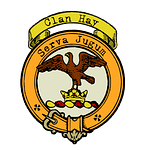Welcome back to A Clan A Day Podcast, brought to you by BagTownClans.com. I’m your host, Colin MacDonald, and today we dive into the fascinating history of Clan Abercromby, a name originating from the Barony of Abercromby in Fife. This clan, though relatively small in number, boasts a significant legacy, from their religious and political struggles to their military accomplishments, which have left an indelible mark on both Scotland and the wider world.
Let’s begin by traveling back to 1296, when William de Abercromby of Fife rendered homage to Edward I of England, a moment in history marking the clan’s early appearance in Scottish records. The Abercrombies of that Ilk remained rooted in Fife, holding the lands of Abercromby and Balcormo, and later acquiring Murthly in Perthshire. However, the main line of the family saw a downturn by the 17th century, ultimately becoming extinct. Yet, the Abercromby story was far from over, with the rise of a second branch from the lands of Birkenbog in Banffshire, which became the leading line of the clan.
The Abercrombies were closely tied to religious turmoil, an aspect that shaped much of their history. Initially devout Catholics, the clan produced several notable religious figures. Robert Abercromby, a Jesuit priest, was one of the clan’s most famous religious leaders, opposing the Scottish Reformation in the late 16th century. His defiance was so fierce that, after the Battle of Glenlivet in 1594, Robert fled Scotland to avoid capture. He is even credited with converting Queen Anne of Denmark, wife of James VI, to Catholicism before her death—a tale steeped in intrigue and controversy. Another prominent figure, David Abercromby, similarly followed a path of resistance to the Protestant faith before eventually converting and publishing a significant anti-Catholic work titled Protestancy Proved Safer Than Popery.
Religious convictions weren’t the only driving force behind Clan Abercromby’s story. They were deeply involved in the political and military conflicts of their time. Alexander Abercromby, the 1st Baronet of Birkenbog, was a fervent Covenanter during the turbulent reign of Charles I. He strongly opposed the king’s attempts to impose Episcopal governance on the Scottish church, a position that earned him royal retaliation. After the Battle of Auldearn in 1645, the Marquis of Montrose took revenge by billeting his troops at Birkenbog, a stark reminder of the Abercrombies’ resolute defiance in the face of royal authority.
This spirit of defiance and loyalty to their causes would continue through the centuries, most notably in the military realm. The most celebrated of the Abercromby clan was Sir Ralph Abercromby (1734-1801), a military leader whose reform of the British army was instrumental in shaping the forces that would later defeat Napoleon. Born in Menstrie, Clackmannanshire, Sir Ralph’s military career spanned multiple continents, from the Caribbean to the Middle East. He played a key role in capturing the Spanish-held island of Trinidad in 1797, and later, in one of his most famous campaigns, led British forces to victory in Egypt at the Battle of Alexandria in 1801. Tragically, he was mortally wounded during the battle, dying from his injuries shortly after. His heroic leadership, however, left a lasting legacy, and in honor of his service, his widow was granted the title Baroness Abercromby of Aboukir and Tullibody.
This military prowess ran deep in the Abercromby family. Sir Ralph’s brother, Sir Robert Abercromby, served with distinction in India and was recognized with the prestigious Order of the Bath. Sir Ralph’s sons followed in their father’s footsteps, each leaving their mark on the military and political landscape of their time. His second son, Sir John Abercromby, was a divisional commander in India and led the capture of Mauritius in 1810, while his third son, James Abercromby, later became the 1st Baron Dunfermline and served as Speaker of the House of Commons from 1835 to 1839.
The clan’s contribution wasn’t limited to warfare or politics. Dr. John Abercrombie, a descendant of the clan, became one of Scotland’s most prominent physicians in the early 19th century. He was considered the leading consulting physician in Scotland and contributed to the medical field through numerous scholarly works. His contributions to medicine mirrored the clan’s tradition of reaching for excellence, a trait encapsulated by their motto, Petit Alta—“He aims at high things.”
The Abercromby clan’s rich history is also reflected in the castles and estates they owned throughout Scotland. From Birkenbog House in Banffshire to Menstrie Castle in Clackmannanshire, these homes stood as symbols of the clan’s enduring presence. Birkenbog House, held by the Abercrombies since the 14th century, was their ancestral seat for centuries. Menstrie Castle, where Sir Ralph Abercromby was born, is another testament to the clan’s deep-rooted heritage, while other estates, such as Forglen House and Inchdrewer Castle, also passed through the hands of various branches of the family.
Today, Clan Abercromby may not be as numerous as others, but their influence is still remembered across Scotland and beyond. Their military feats, religious fervor, and intellectual contributions have all cemented their place in Scottish history. Whether fighting on the battlefield, defending their religious convictions, or striving for excellence in their professions, the Abercrombies have always aimed high.
Thank you for joining us on this episode of A Clan A Day Podcast as we explored the remarkable history of Clan Abercromby. Be sure to tune in tomorrow for another fascinating journey through Scotland’s rich tapestry of clans. I’m Colin MacDonald, and as always, Go n-éirí an bóthar leat.











